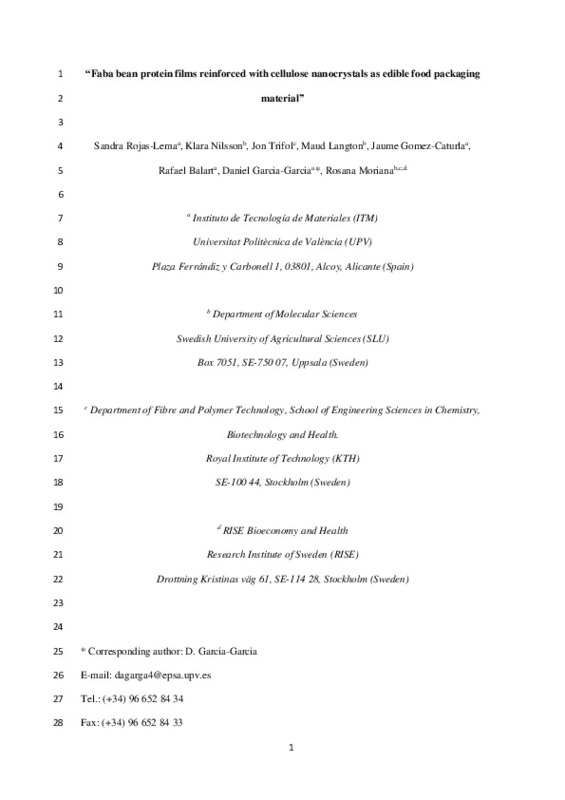JavaScript is disabled for your browser. Some features of this site may not work without it.
Buscar en RiuNet
Listar
Mi cuenta
Estadísticas
Ayuda RiuNet
Admin. UPV
Faba bean protein films reinforced with cellulose nanocrystals as edible food packaging material
Mostrar el registro sencillo del ítem
Ficheros en el ítem
| dc.contributor.author | Rojas-Lema, Sandra
|
es_ES |
| dc.contributor.author | Nilsson, Klara
|
es_ES |
| dc.contributor.author | Trifol, Jon
|
es_ES |
| dc.contributor.author | Langton, Maud
|
es_ES |
| dc.contributor.author | Gómez-Caturla, Jaume
|
es_ES |
| dc.contributor.author | Balart, Rafael
|
es_ES |
| dc.contributor.author | Garcia-Garcia, Daniel
|
es_ES |
| dc.contributor.author | Moriana, Rosana
|
es_ES |
| dc.date.accessioned | 2024-01-10T19:03:24Z | |
| dc.date.available | 2024-01-10T19:03:24Z | |
| dc.date.issued | 2021-12 | es_ES |
| dc.identifier.issn | 0268-005X | es_ES |
| dc.identifier.uri | http://hdl.handle.net/10251/201739 | |
| dc.description.abstract | [EN] In the present work, transparent films were obtained by the solution casting method from faba bean protein isolate (FBP), reinforced with different cellulose nanocrystals (CNCs) content (1, 3, 5 and 7 wt%), obtained by acid hydrolysis of pine cone, and using glycerol as plasticizer. The influence of different CNCs loadings on the mechanical, thermal, barrier, optical, and morphological properties was discussed. Microstructurally, the FTIR and FESEM results corroborated the formation of intramolecular interactions between the CNCs and proteins that lead to more compact and homogeneous films. These interactions had a positive influence on the mechanical strength properties, which is reflected in higher tensile strength and Young's modulus in reinforced films with respect to the control film, resulting in stiffer films as the CNCs content increases. Thermal stability of the FBP films was also improved with the presence of CNCs, by increasing the characteristic onset degradation temperature. In addition, the linkages formed between the CNCs, and proteins reduced the water affinity of the reinforced films, leading to a reduction in their moisture content and water solubility, and an increase in their water contact angle, obtaining more hydrophobic films as the CNCs content in the matrix increased. The addition of CNCs in the FBP film also considerably improved its barrier properties, reducing its water vapour transmission rate (WVTR) and oxygen transmission rate (OTR). The present work shows the possibility of obtaining biobased and biodegradable films of CNC-reinforced FBP with improved mechanical, thermal and barrier properties, and low water susceptibility, which can be of great interest in the food packaging sector as edible food packaging material. | es_ES |
| dc.description.sponsorship | This research was supported by the Ministry of Science and Inno-vation (MICI) [MAT2017-84909-C2-2-R] . S. Rojas-Lema thanks the Generalitat Valenciana (GVA) for the financial support through a San-tiago Grisolia grant (GRISOLIAP/2019/132) . D. Garcia-Garcia wants to thank the Ministry of Science, Innovation and Universities for their financial support through the "Jose Castillejo" mobility grant (CAS19/00332). | es_ES |
| dc.language | Inglés | es_ES |
| dc.publisher | Elsevier | es_ES |
| dc.relation.ispartof | Food Hydrocolloids | es_ES |
| dc.rights | Reconocimiento - No comercial - Sin obra derivada (by-nc-nd) | es_ES |
| dc.subject | Faba beans | es_ES |
| dc.subject | Proteins films | es_ES |
| dc.subject | Cellulose nanocrystals (CNCs) | es_ES |
| dc.subject | Food packaging | es_ES |
| dc.subject | Pine cone | es_ES |
| dc.subject.classification | CIENCIA DE LOS MATERIALES E INGENIERIA METALURGICA | es_ES |
| dc.title | Faba bean protein films reinforced with cellulose nanocrystals as edible food packaging material | es_ES |
| dc.type | Artículo | es_ES |
| dc.identifier.doi | 10.1016/j.foodhyd.2021.107019 | es_ES |
| dc.relation.projectID | info:eu-repo/grantAgreement/AEI/Plan Estatal de Investigación Científica y Técnica y de Innovación 2013-2016/MAT2017-84909-C2-2-R/ES/PROCESADO Y OPTIMIZACION DE MATERIALES AVANZADOS DERIVADOS DE ESTRUCTURAS PROTEICAS Y COMPONENTES LIGNOCELULOSICOS/ | es_ES |
| dc.relation.projectID | info:eu-repo/grantAgreement/GENERALITAT VALENCIANA//GRISOLIAP%2F2019%2F132//AYUDA SANTIAGO GRISOLIA PROYECTO DESARROLLO DE MEZCLAS DE BIOPOLIMEROS/ | es_ES |
| dc.relation.projectID | info:eu-repo/grantAgreement/MEFP//CAS19%2F00332//Ayuda de movilidad en el extranjero para jóvenes doctores "José Castillejo"/ | es_ES |
| dc.rights.accessRights | Abierto | es_ES |
| dc.contributor.affiliation | Universitat Politècnica de València. Escuela Politécnica Superior de Alcoy - Escola Politècnica Superior d'Alcoi | es_ES |
| dc.description.bibliographicCitation | Rojas-Lema, S.; Nilsson, K.; Trifol, J.; Langton, M.; Gómez-Caturla, J.; Balart, R.; Garcia-Garcia, D.... (2021). Faba bean protein films reinforced with cellulose nanocrystals as edible food packaging material. Food Hydrocolloids. 121. https://doi.org/10.1016/j.foodhyd.2021.107019 | es_ES |
| dc.description.accrualMethod | S | es_ES |
| dc.relation.publisherversion | https:doi.org/10.1016/j.foodhyd.2021.107019 | es_ES |
| dc.type.version | info:eu-repo/semantics/publishedVersion | es_ES |
| dc.description.volume | 121 | es_ES |
| dc.relation.pasarela | S\444394 | es_ES |
| dc.contributor.funder | GENERALITAT VALENCIANA | es_ES |
| dc.contributor.funder | AGENCIA ESTATAL DE INVESTIGACION | es_ES |
| dc.contributor.funder | Ministerio de Educación y Formación Profesional | es_ES |







![[Cerrado]](/themes/UPV/images/candado.png)

